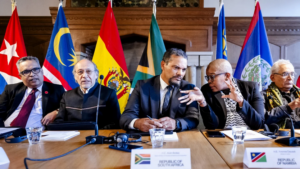Holding Israel accountable: What is the Hague Group?

Alvin Botes (centre), South Africa’s deputy foreign minister, and Yvonne Dausab (2nd right), Namibia’s justice minister, during a press conference of Progressive International and The Hague Group in The Hague on 31 January 2025
Sondos Asem reports in Middle East Eye on 11 February 2025:
On 31 January, representatives of nine countries convened in The Hague, Netherlands, to declare a global alliance, named The Hague Group, to hold Israel accountable under international law.
It was a historic precedent, marking the first such initiative since the Nakba and the establishment of Israel to coordinate state action to prevent violations of international law committed against the Palestinian people.
The founding members of the group are Belize, Bolivia, Colombia, Cuba, Honduras, Malaysia, Namibia, Senegal and South Africa. Some of these states have already taken major steps over the past 15 months to defend and enforce international law.
South Africa, for example, brought a landmark case against Israel at the International Court of Justice in The Hague for alleged violations of the Genocide Convention in Gaza.
Several states in the coalition have later joined South Africa’s case at the ICJ, including Bolivia, Colombia and Namibia. Additionally, Namibia and Malaysia blocked ships carrying arms to Israel from docking at their ports, while Colombia halted coal exports to Israel. Colombia and Bolivia also recalled their ambassadors from Israel to protest its devastating war on Gaza.
Such efforts, however, lacked coordination, and this is where The Hague Group is set to play a significant role, Varsha Gandikota-Nellutla, the chair of the group, told Middle East Eye. Gandikota-Nellutla, who is the co-general coordinator of Progressive International, a leftist transnational political group, said the group has been formed as a reaction to the non-compliance of states with binding international legal obligations.
This is a reference to the pushback by a number of western states against the International Criminal Court’s arrest warrants for Israel’s Prime Minister Benjamin Netanyahu and ex-Defence Minister Yoav Gallant in November 2024, and non-compliance with orders by the ICJ to halt Israel’s violations of the Genocide Convention.
“This group really began with the one-year mark of the genocide, and the brazen impunity granted to Israel – from the neglect of the ICJ ruling and the the real defiance of the ICC arrest warrants,” she said.
The Netanyahu arrest warrant was the first in the court’s history to be issued against politicians from a western-allied nation.
According to the Rome Statute, the treaty that established the ICC in 2002, all state parties have a legal obligation to arrest and surrender to The Hague those wanted by the court.
But a number of western states that are ICC parties, including France, Italy and Hungary, announced that they would not enforce the warrants if Netanyahu lands on their territory, claiming he enjoys immunity under international law. The position has been disputed by the ICC, as well as leading immunity experts around the world.
Third-state obligations
The year 2024 witnessed a record number of legal cases in The Hague related to Israel’s conduct in Gaza, including binding orders by the ICJ and the ICC arrest warrants for Netanyahu and Gallant.
